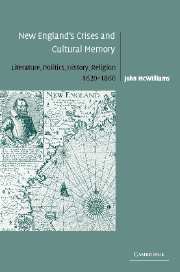Book contents
- Frontmatter
- Contents
- Acknowledgments
- Introduction: Crisis rhetoric: exclusion in New England history
- PART ONE PLANTATION AND SETTLEMENT
- PART TWO TIME OF TROUBLES
- PART THREE REVOLUTION
- Headnote
- 7 Boston revolt and Puritan restoration: 1760–1775
- 8 Shots heard round the world
- 9 Abolition, “white slavery,” and regional pride
- Epilogue: “bodiless echoes”
- Notes
- Index
7 - Boston revolt and Puritan restoration: 1760–1775
Published online by Cambridge University Press: 22 September 2009
- Frontmatter
- Contents
- Acknowledgments
- Introduction: Crisis rhetoric: exclusion in New England history
- PART ONE PLANTATION AND SETTLEMENT
- PART TWO TIME OF TROUBLES
- PART THREE REVOLUTION
- Headnote
- 7 Boston revolt and Puritan restoration: 1760–1775
- 8 Shots heard round the world
- 9 Abolition, “white slavery,” and regional pride
- Epilogue: “bodiless echoes”
- Notes
- Index
Summary
Popular mythologizers often forget that the confrontations at Lexington, Concord, Ticonderoga, and Bunker Hill occurred as the culmination, not the onset, of revolt in Massachusetts. Historians' narratives of “America's” growing revolutionary agitation rightly start in 1761 with James Otis Jr.'s argument against government's use of Writs of Assistance to apprehend suspected smugglers in Boston (“An Act Against the Constitution is void”). In accord with the Whig historical tradition described by Bernard Bailyn, Otis appealed to Liberty as a political virtue emanating from the proper balance of the powers of King, Lords, and Commons within the British Constitution. However, as in the 1680s, citing such a right to self-governance while avoiding the issue of dockside taxation had a twofold appeal. For vivid imagery of a people's insurgency within (or against) Liberty's balance of powers, it has proven hard to surpass the sequence of incidents from the plundering of Andrew Oliver's and Thomas Hutchinson's houses, to the defense of Hancock's sloop Liberty, to the Boston Massacre in King Street, to the Boston Tea Party, and finally to the first meetings of the independent Massachusetts Congress and the gathering of the volunteer Army of New England. As rebellious New Englanders aimed their rhetorical weapons first at Parliament (1765), then at the British magistracy (1768–1775), finally at the King (1775–1776), and constantly at the appointive Provincial government, they slowly became republicans, not from initial conviction, but almost faute de mieux, as if they had reluctantly discovered that Liberty must be invested, not in charter privileges, but in a new polity, albeit with a Roman precedent.
- Type
- Chapter
- Information
- New England's Crises and Cultural MemoryLiterature, Politics, History, Religion, 1620–1860, pp. 193 - 226Publisher: Cambridge University PressPrint publication year: 2004

